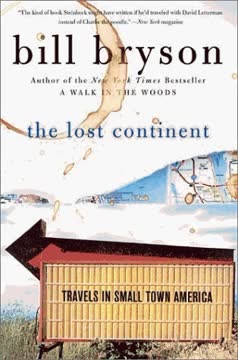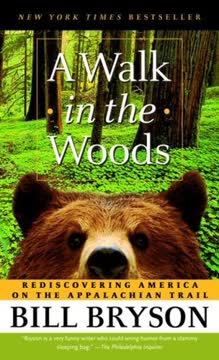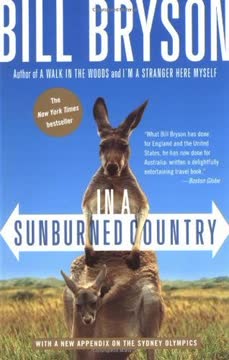Key Takeaways
1. The Illusion of Home: Nostalgia vs. Harsh Reality
I cannot describe the sense of loss. Half my memories were inside that house.
A return to roots. Bill Bryson's journey begins with a return to his childhood home in Des Moines, Iowa, after years living in England. He seeks to reconnect with the "magic places" of his youth, particularly his grandparents' house in Winfield. However, the reality he finds is often a stark contrast to his idealized memories.
Childhood memories shattered. The once-vibrant Winfield of his youth, with its bustling Main Street and beloved family home, has decayed into a "shack" surrounded by cheap developments, its railroad tracks and the old Victorian mansion gone. This physical decline mirrors a profound sense of personal loss, as the places that held his cherished memories no longer exist as he remembered them.
The impossibility of going home. This initial disappointment sets a melancholic tone for much of the trip, highlighting the universal truth that one can rarely truly "go home again." The places and people change, and the past remains an elusive, often idealized, memory.
2. America's Vastness and Monotonous Landscape
It is a thousand miles from the sea in any direction, four hundred miles from the nearest mountain, three hundred miles from skyscrapers and muggers and things of interest, two hundred miles from people who do not habitually stick a finger in their ear and swivel it around as a preliminary to answering any question addressed to them by a stranger.
Endless plains. Bryson frequently observes the immense, often featureless, expanse of the American heartland. States like Iowa, Illinois, and Nebraska stretch for hundreds of miles, dominated by corn, soybeans, and hogs, offering little visual stimulation. This vastness makes travel feel interminable, with towns often separated by "a hundred miles or more."
Geographical disorientation. The lack of distinct landmarks and the sheer scale of the country often lead to a sense of disorientation. Bryson notes how entire towns can "go missing" from maps, and how highway authorities provide peripheral facts rather than useful directional information, making navigation a frustrating endeavor.
The quiet emptiness. Beyond the visual monotony, the quietness of these vast, empty spaces is striking. Bryson humorously suggests that in such a stimulus-deprived environment, one might expect people to still be watching "Ozzie and Harriet" and voting for Eisenhower, highlighting the slow pace of life.
3. The Erosion of Small-Town Charm
The town had no center. It had been eaten by shopping malls.
Homogenization of towns. Bryson laments the decline of unique small-town America, replaced by a ubiquitous "commercial squalor." Towns like Carbondale, Illinois, have lost their distinct centers, becoming endless strips of:
- Fast-food places
- Motor inns
- Discount cities
- Shopping malls
Loss of community. This shift means the disappearance of traditional gathering spots like town squares, local diners, and independent movie theaters. The idealized small town, where people strolled sidewalks and knew their neighbors, has been supplanted by car-centric environments that discourage walking and local interaction.
The "Anywhere, USA" phenomenon. Many towns, regardless of their historical significance, now look indistinguishable. This uniformity, driven by convenience and chain businesses, strips away local character, leaving behind a sense of placelessness that Bryson finds deeply depressing.
4. The Peculiarities of American Consumerism
Clearly some time ago makers and consumers of American junk food passed jointly through some kind of sensibility barrier in the endless quest for new taste sensations.
A culture of excess. Bryson is fascinated and often appalled by American consumer habits, particularly in food and advertising. He notes the bizarre array of new junk food products, suggesting a desperate search for novel taste sensations, akin to "junkies who have tried every known drug."
Advertising's pervasive influence. The sheer volume and nature of American advertising, from the New York Times supplements to TV commercials, reveal a society constantly bombarded with inducements to buy. Bryson observes how these ads promise a "brief buzz" and contribute to a "glazed look" in many Americans.
The allure of gadgets. He also highlights the American obsession with labor-saving devices and gadgets, particularly among RV enthusiasts, who equip their vehicles with every conceivable convenience, even at the expense of genuine experience or common sense.
5. Stark Contrasts: Friendliness Amidst Underlying Tensions
Murder is terrifyingly easy in America.
A land of extremes. Bryson frequently encounters a striking dichotomy in American society: overwhelming friendliness coexisting with unsettling undercurrents of violence, ignorance, and social division. He notes the immediate warmth of strangers, particularly in the Midwest, where "everyone is happy and friendly and strangely serene."
The shadow of violence. However, this amiability is often juxtaposed with the pervasive reality of crime. Bryson recounts chilling personal anecdotes and observations:
- Witnessing a murder scene as a child in Washington D.C.
- A friend's boss being shot in St. Louis for his money.
- The casual reporting of daily murders on local news, particularly in Las Vegas.
- The ease with which one can "kill a stranger, dump the body... and be 2,000 miles away."
Social divisions. Beyond violence, Bryson observes lingering racial tensions, particularly in the South, and a widespread "contagion of ignorance" among young people, as evidenced by their lack of basic general knowledge. This creates a complex, sometimes disturbing, portrait of American society.
6. The Enduring Comedy and Frustration of Family Road Trips
My father’s particular specialty was the ability to get hopelessly lost without ever actually losing sight of his target.
Chaotic childhood adventures. Bryson's recollections of family vacations are a recurring source of humor and relatable frustration. His father, a master of getting lost and economizing, would lead the family on epic, often miserable, journeys in a "cruddy car."
Parental quirks. These trips were characterized by:
- His father's "quietly maniacal urge" to leave Iowa.
- His mother's limited vocabulary ("I don't know, dear," "Can I get you a sandwich, honey?").
- His father's insistence on "crummiest hotels" and roadside diners with questionable hygiene.
- The children's mischievous antics, like dropping "porcupine" apples out the window.
The quest for cheap fun. Despite the discomforts, these memories are tinged with affection, highlighting the universal experience of family travel. His father's relentless pursuit of free or cheap attractions, like historical markers, often led to unexpected detours and comical situations.
7. A Search for the Elusive "Perfect Town"
It was inconceivable that a nation so firmly attached to small-town ideals, so dedicated in its fantasies to small-town notions, could not have somewhere built one perfect place...
The Hollywood ideal. Bryson embarks on his journey with a romanticized vision of the "perfect town," shaped by old Hollywood movies and classic literature. This ideal features tree-lined Main Streets, friendly merchants, and a timeless tranquility, a place where "Bing Crosby would be the priest, Jimmy Stewart the mayor."
Reality falls short. His search, however, consistently yields disappointment. Places like Springfield, Illinois, and many New England towns, while sometimes pleasant, lack the magical quality of his imagined Amalgam. They are often marred by commercial sprawl or an artificial, "yuppified" charm.
Piecing together perfection. Bryson eventually realizes that his ideal town cannot be found in one place. Instead, it must be "collected piecemeal"—a handsome courthouse here, a charming square there. This acknowledges that the American ideal is a composite, a mosaic of appealing elements rather than a single, perfect entity.
8. The Unpredictable and Awe-Inspiring American Landscape
Nothing prepares you for the Grand Canyon.
Natural wonders and harsh realities. Bryson encounters breathtaking natural beauty, from the "majestic undulations" of the Blue Ridge Mountains to the "glorious" Collegiate Peaks. However, these wonders are often accompanied by extreme and unpredictable weather, such as sudden blizzards in the desert or dense fog obscuring iconic sights like the Grand Canyon.
The power of nature. The Grand Canyon, in particular, leaves him speechless, its "scale almost beyond comprehension" and its "overwhelming" silence. This experience, along with the vastness of the Great Lakes and the ruggedness of the Rockies, underscores the raw, untamed power of American nature.
Human impact. Yet, even in these grand landscapes, human intrusions are evident, from "ugly trailer parks" to "charred land" from forest fires. This highlights the ongoing tension between preserving wilderness and the pressures of human development.
9. The American Obsession with Convenience
The whole idea is not to expose yourself to a moment of discomfort or inconvenience-indeed, not to breathe fresh air if possible.
The drive for ease. Bryson observes a pervasive American desire for convenience, often at the expense of genuine experience or traditional charm. This is most evident in the proliferation of:
- Drive-through services
- Massive RVs designed as "life-support systems on wheels"
- Shopping malls replacing walkable downtowns
- Highways that bypass small towns entirely
Sacrificing charm for efficiency. This pursuit of effortless living leads to a homogenization of the landscape and a detachment from the environment. Bryson notes the irony of people driving hundreds of miles in hermetically sealed vehicles to "enjoy" nature without actually experiencing it.
The cost of comfort. The constant quest for convenience, while making life easier, often strips away the unique character and unexpected pleasures of travel and daily life, leaving behind a bland, predictable landscape.
10. The Enduring American Character
Everyone is happy and friendly and strangely serene.
A unique blend of traits. Despite his criticisms and observations of American flaws, Bryson consistently returns to the fundamental friendliness and amiability of its people. From the "strangely serene" residents of Des Moines to the welcoming locals in Littleton, New Hampshire, he finds a pervasive openness.
Trusting and open. Americans, particularly in the Midwest, are portrayed as "trusting and amiable and open," albeit sometimes "a tad slow" in processing jokes. This inherent good nature is a recurring theme, contrasting with the more cynical or reserved attitudes found elsewhere.
Peculiarities and resilience. Bryson's encounters with various American types—from the eccentric Mr. Piper to the "demented" RV enthusiasts—reveal a diverse and often peculiar national character. Yet, there's also a resilience and an unwavering belief in their country, even when faced with its imperfections.
Last updated:
Review Summary
The Lost Continent receives mixed reviews, with some praising Bryson's wit and humor while others criticize his cynical, mean-spirited tone towards small-town America. Many readers find his observations funny and insightful, appreciating his commentary on American culture and landscapes. However, others feel he is overly negative, dismissive of local people, and fails to engage meaningfully with the places he visits. Some reviewers note that the book's humor and observations may have aged poorly since its 1989 publication, particularly regarding political correctness and prices mentioned.
Similar Books
Download PDF
Download EPUB
.epub digital book format is ideal for reading ebooks on phones, tablets, and e-readers.















